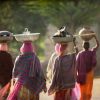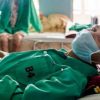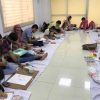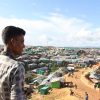News headlines in March 2020
Walking the Talk on Climate Change after the Pandemic: Reorienting State-Owned Enterprises towards Sustainability
- Inter Press Service

MEXICO, Mar 31 (IPS) - This year started with the news of the appearance of a new virus, COVID-19. The impact and severity of its effects in public health, mortality and the world economy are overwhelming. No public health system was prepared for this crisis, and yet governments are reacting deploying different policies to mitigate the crisis, and recover as fast as possible.
Life in the Time of COVID-19: Quo Vadis Homo Sapiens?
- Inter Press Service

NEW YORK, Mar 31 (IPS) - The writing is on the wall for all to see from far and wide – there is nowhere to hide from this invisible enemy, a new coronavirus, maybe with the exception of self-isolation, quarantined at home and even then, we are not 100% safe.
West First Policies Expose Myths
- Inter Press Service

SYDNEY and KUALA LUMPUR, Mar 31 (IPS) - As the epicentre of the COVID-19 pandemic shifts from China to the developed West, all too many rich countries are acting selfishly, invoking the ‘national interest', by banning exports of vital medical supplies.
Harness Youth to Change World's Future
- Inter Press Service

NEW YORK, Mar 31 (IPS) - Vanessa Nakate of Uganda may have been cropped out of a photograph taken at the World Economic Forum, but she along with Swedish activist Greta Thunberg have made the climate crisis centre stage.
Mexico's Plan to Upgrade Hydropower Plants Faces Hurdles
- Inter Press Service

MEXICO CITY, Mar 30 (IPS) - Water security and profitability are the Achilles heels of the plan to modernise 60 hydroelectric plants in Mexico, drawn up by the administration of President Andrés Manuel López Obrador.
Life in the Times of Corona: Lockdown & Livelihood in the Lurch
- Inter Press Service

NEW DELHI, Mar 30 (IPS) - Migrant workers have thronged there in tens of thousands with their families after having lost their jobs after the nationwide lockdown was announced by Indian Prime Minister Narendra Modi on 24 March 2020.
Neglected Diseases Kill More People than COVID-19 – It’s Time to Address Them
- Inter Press Service

ABUJA, Mar 30 (IPS) - As COVID-19 surges globally and leaves fear and panic in its wake, global efforts are underway to find a cure. Yet, the same level of response is lacking for several other infectious diseases that kill millions annually. These kinds of neglected tropical diseases (NTDs) are a broad group of communicable diseases which affect more than two billion people and cost developing economies billions of dollars every year.
A Story of Triumphs and Tribulations: Implementing Services for Autism in Bangladesh
- Inter Press Service

DHAKA, Bangladesh, Mar 30 (IPS) - A few days ago, a friend said to me that my focus on autism, although rather successful, had "sucked out all energy from other critical areas of social need in Bangladesh."
My friend wanted to know if I would be interested in expanding my visibility and successful approach to autism, to other issues that have apparently been left by the wayside due to everyone's eagerness to work on an issue popular with the Prime Minister's daughter!
I know my friend's statement was meant to be provocative, but it also made me reflect on what it was that I had set out to do when I began working in this area in Bangladesh.
Has enough been achieved for me to ‘pass on the baton' to the many others who have now dedicated themselves to this issue, thereby beginning to shift my focus towards addressing other social needs both in Bangladesh and elsewhere?
Supporting Informal Workers During the COVID-19 Crisis
- Inter Press Service

HYDERABAD, India, Mar 30 (IPS) - Farmers, agricultural labourers, and informal sector workers are the worst hit by COVID-19 and the resulting lockdowns. Here are some steps that the government and banks can take to help them cope financially.
Slums, Camps, Terrorism: Experts Worry about Coronavirus Hitting South Asia
- Inter Press Service

UNITED NATIONS, Mar 30 (IPS) - As coronavirus makes its way through different continents, countries, and communities around the world having claimed more than 23,000 lives, experts are ringing alarm bells about the implications of the disease as it hits South Asia, which hosts almost 2 billion of the world's population.
 Global Issues
Global Issues

